Are you considering a cobra tattoo? The cobra is a unique animal that has been depicted in various cultures as a symbol of power, wisdom, and protection. If you’re looking for a tattoo design that embodies these traits, then a cobra tattoo might be perfect for you. In this article with Impeccable Nest, we will delve into the meaning of cobra tattoos and the different designs available. We will also provide some advice on getting a cobra tattoo and answer some common questions about them.
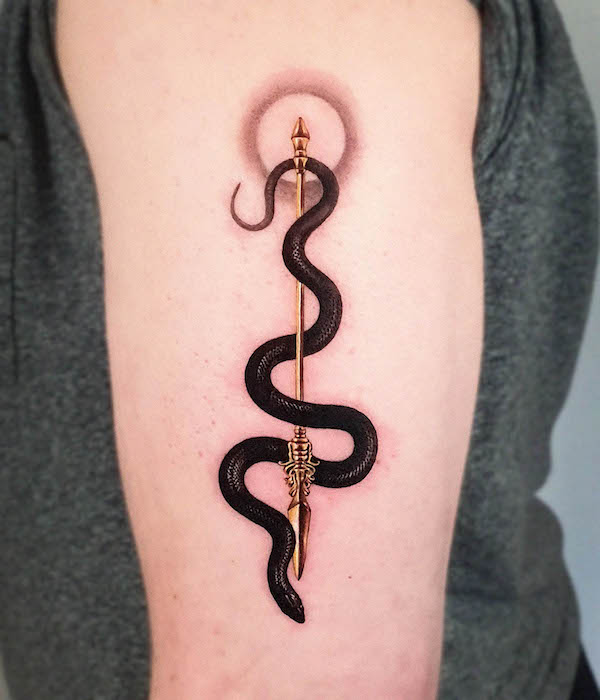
The Cobra Tattoo Meaning: From Classic to Contemporary
Cobras are a type of venomous snake that can strike fear into the hearts of many. However, in certain cultures, they are revered and seen as symbols of power, wisdom, and protection.
Power
The cobra tattoo holds deep symbolism and meaning, representing power, strength, and protection. The association of the cobra with power stems from its remarkable ability to overpower prey that are much larger than itself. This awe-inspiring feat has made it a symbol of strength and dominance throughout history.
In ancient Egypt, cobras held a significant place in their mythology and culture. They were revered as protectors of the pharaohs, who were considered divine rulers endowed with immense power. The image of a cobra, often depicted with an expanded hood, was commonly seen on the headdresses of pharaohs, emphasizing their authority and protection.
The cobra’s connection to the pharaohs goes beyond mere symbolism. The Egyptian cobra, known as the uraeus, was believed to possess magical qualities that safeguarded the ruler against evil forces and enemies. It was seen as a representation of the goddess Wadjet, a protector and patron deity of Lower Egypt. Wearing the cobra symbol was not only a demonstration of power but also a means of invoking divine protection.
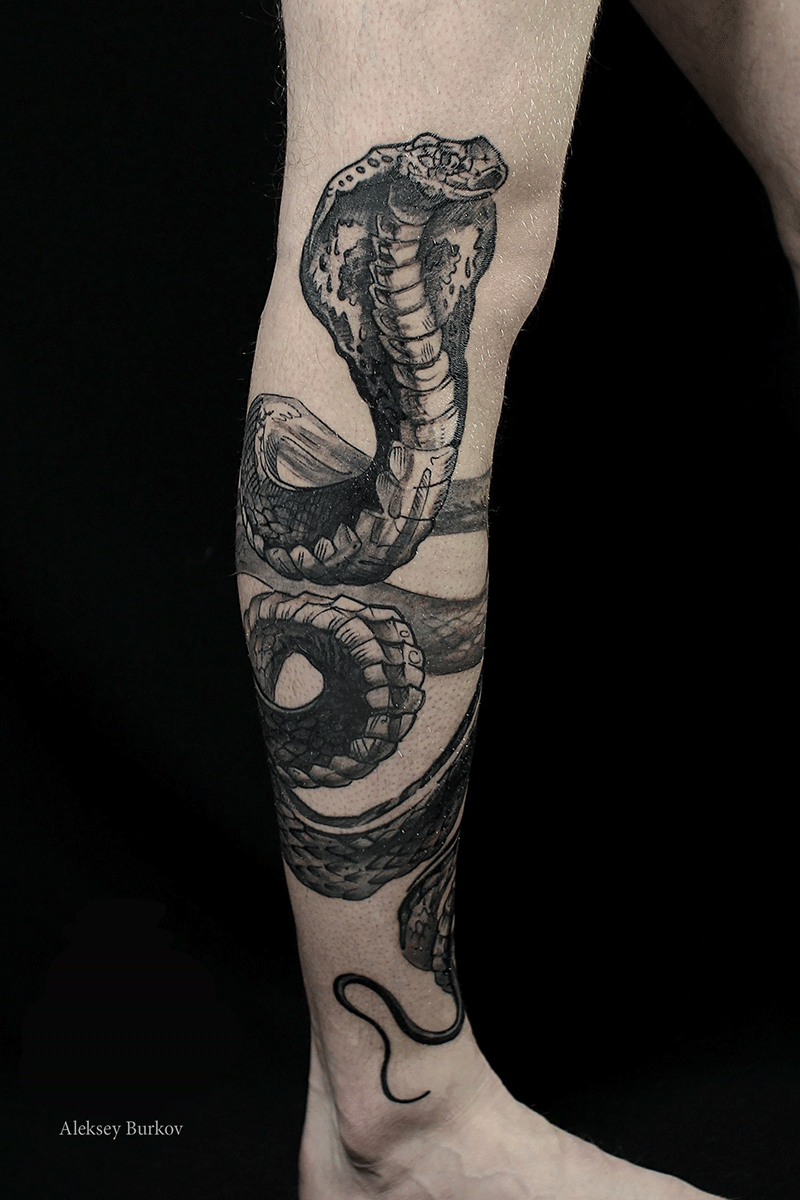
Beyond ancient Egypt, the cobra’s association with power resonates across various cultures and religions. In Hinduism, Lord Shiva is often depicted with a cobra wrapped around his neck, symbolizing his immense power and control over life and death. The cobra’s presence highlights Shiva’s role as a destroyer and creator, connecting it to ideas of transformation and regeneration.
Additionally, the cobra has found its way into modern symbolism, particularly in the realm of tattoos. People who choose to ink themselves with a cobra tattoo often seek to embody the qualities attributed to this majestic creature—power, strength, and protection. The tattoo serves as a reminder of their ability to overcome challenges and face adversity head-on.
Furthermore, the cobra tattoo can also represent resilience and adaptability. Cobras are known for their ability to adapt to various environments, making them symbols of flexibility and versatility. Those who opt for a cobra tattoo may identify with these traits and strive to navigate life’s twists and turns with grace and determination.
In summary, the cobra tattoo carries a rich tapestry of meaning deeply rooted in history and mythology. Its association with power, strength, and protection stems from ancient Egypt, where cobras were worshipped as guardians of the pharaohs. Beyond Egypt, the cobra is revered across cultures and religions for its ability to take down larger prey and its representation of transformation and regeneration. Choosing a cobra tattoo signifies a desire to embody these qualities, demonstrating an individual’s strength, resilience, and adaptability in the face of life’s challenges.
Wisdom
The Cobra tattoo holds significant meaning, particularly in Hindu mythology where it is closely associated with the revered god Shiva. Steeped in symbolism, this mystical creature represents wisdom, knowledge, and the awakening of inner consciousness. Delving deeper into its significance sheds light on the profound connotations embodied by this extraordinary symbol.
In Hinduism, Shiva is regarded as one of the principal deities, embodying both creation and destruction. He is known as the Supreme Being who personifies transcendence, enlightenment, and spiritual transformation. As a result, various elements of nature, including animals, hold deep symbolism in relation to Shiva’s vast domain. Among these, the cobra stands out prominently.
The raised hood of the cobra serves as a visual representation of the cobra’s majestic presence, mirroring the expansion of consciousness and heightened awareness. When confronted, a cobra typically raises its head and spreads its hood as a warning sign, signifying protection and defense against perceived threats. Similarly, this imagery is believed to epitomize the awakening of inner knowledge and understanding.
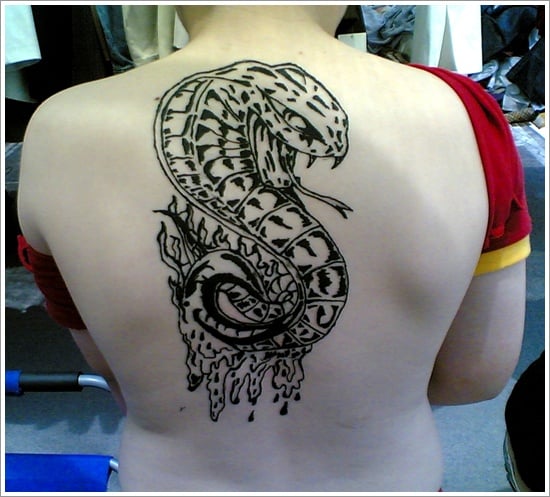
Further, the cobra’s association with Shiva is also linked to Kundalini energy, an essential concept within Hindu philosophy. Kundalini is often depicted as a dormant serpent coiled three and a half times at the base of the spine. Through spiritual practices such as meditation and yoga, this energy is said to be awakened and rise upward, traversing various chakras (energy centers) within the body until it reaches the crown chakra, resulting in enlightenment and self-realization.
The cobra tattoo, therefore, serves as a powerful reminder of the potential for personal growth and spiritual awakening. It symbolizes the journey towards expanding one’s consciousness, acquiring deeper knowledge, and attaining wisdom akin to that of Shiva himself. In essence, wearing this tattoo can act as a constant motivation to seek enlightenment and strive for self-improvement.
Moreover, the cobra is also associated with protection and fertility in Hindu mythology. As Shiva is considered the destroyer of evil forces and a source of strength, the cobra’s presence signifies the ability to ward off negative energies and offer guardianship. Consequently, the tattoo can serve as a talisman, providing its bearer with a sense of security and shielding them from harm.
In contemporary society, the Cobra tattoo has transcended its historical and religious roots and gained popularity for its aesthetic appeal and the captivating allure it holds. Many individuals are drawn to this symbol not only for its cultural significance but also for its striking visual impact. The intricate details of a coiled cobra with its hood raised make for a visually stunning tattoo design that captivates admirers and intrigues onlookers.
Whether an individual chooses to embrace the Cobra tattoo for its deep spiritual meaning or simply appreciates its aesthetic beauty, it remains a timeless symbol that resonates with diverse audiences. Its connection to Shiva, wisdom, knowledge, consciousness expansion, and protection ensures that this tattoo will continue to hold profound significance for those who choose to adorn themselves with this mesmerizing creature.
Protection
The cobra tattoo holds significant meaning across various cultures, particularly in ancient Egypt and India. These civilizations revered the cobra as a symbol of protection and regarded it with great respect. As such, the cobra was often depicted on amulets, jewelry, and even temple walls to ward off evil spirits and safeguard individuals from harm.
In ancient Egypt, the cobra held immense religious significance. It was closely associated with the goddess Wadjet, who was the protector of Lower Egypt and the patron deity of the pharaoh. Wadjet was often portrayed as a cobra or as a woman with a cobra’s head, known as a uraeus. The pharaoh wore the uraeus on his crown as a symbol of divine authority and protection.
The cobra symbolized the power of the pharaoh and their ability to fend off threats. The image of the cobra on amulets and other adornments served as a talisman, believed to keep evil forces at bay and provide the wearer with strength and protection. It was also believed that the cobra possessed the power to ward off illness and ensure good health.
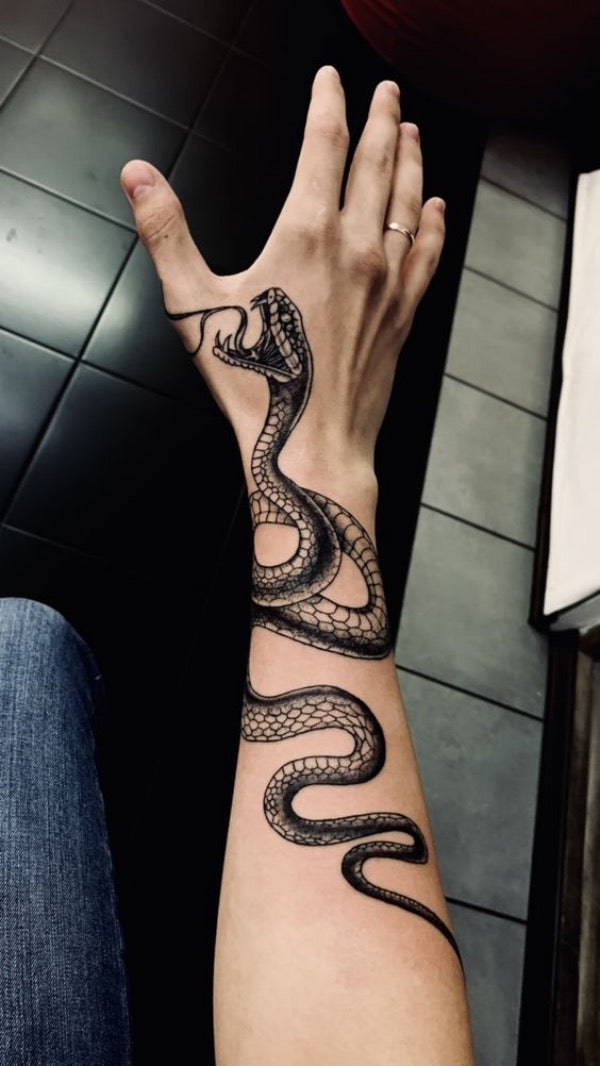
Similarly, in ancient Indian mythology and spirituality, the cobra held a prominent place. Known as “Naga,” the snake was considered a divine being associated with Lord Shiva, one of the principal deities in Hinduism. Lord Shiva is often depicted with a cobra around his neck, symbolizing his mastery over fear and death.
The Naga is also believed to be a guardian of spiritual treasures and sacred places. Many temples dedicated to Lord Shiva feature sculptures and carvings of cobras, indicating their protective role. People would often seek blessings from these Nagas to ensure their safety and well-being.
Today, the cobra tattoo continues to carry the essence of protection and warding off negative energies. Individuals who choose to get a cobra tattoo may connect with its symbolism as a powerful guardian and believe that it will provide them with a sense of security and strength.
The cobra tattoo design can vary, but it often showcases the snake in a dynamic pose, ready to strike if necessary. Some tattoos highlight the snake’s hooded head, emphasizing its intimidating presence. Others may incorporate intricate patterns or include additional elements like lotus flowers, skulls, or flames to convey specific meanings or personal beliefs.
Ultimately, the cobra tattoo represents resilience, protection, and the ability to face challenges fearlessly. It is a symbol of inner strength, reminding the wearer to stay vigilant and assertive when confronted with adversity. Furthermore, it honors the rich cultural heritage associated with the cobra and serves as a testament to the enduring power of ancient beliefs and traditions.
Transformation
Snakes, in general, have long been portrayed as powerful and mysterious creatures in many cultures around the world. The cobra, specifically, holds a significant place in various mythologies and symbolisms. When it comes to tattoo art, the cobra tattoo often carries deep meanings that resonate with individuals who have undergone profound transformations in their lives.
One of the key associations with snakes, including the cobra, is the notion of transformation. Snakes are known for shedding their skin, leaving behind the old and embracing the new. This incredible process has captivated human imagination for centuries, representing the concept of rebirth, renewal, and the cycle of life. Therefore, those who have experienced a major change or transition, be it personal, emotional, or spiritual, might opt for a cobra tattoo to commemorate their journey.
The act of undergoing a significant transformation is not always easy. It requires great strength, resilience, and determination to embrace change and venture into the unknown. The cobra tattoo serves as a constant reminder of the obstacles overcome, the challenges faced, and the courage exhibited during this transformative period. It becomes a symbol of personal growth and development, encapsulating the essence of one’s journey towards becoming something new and better.
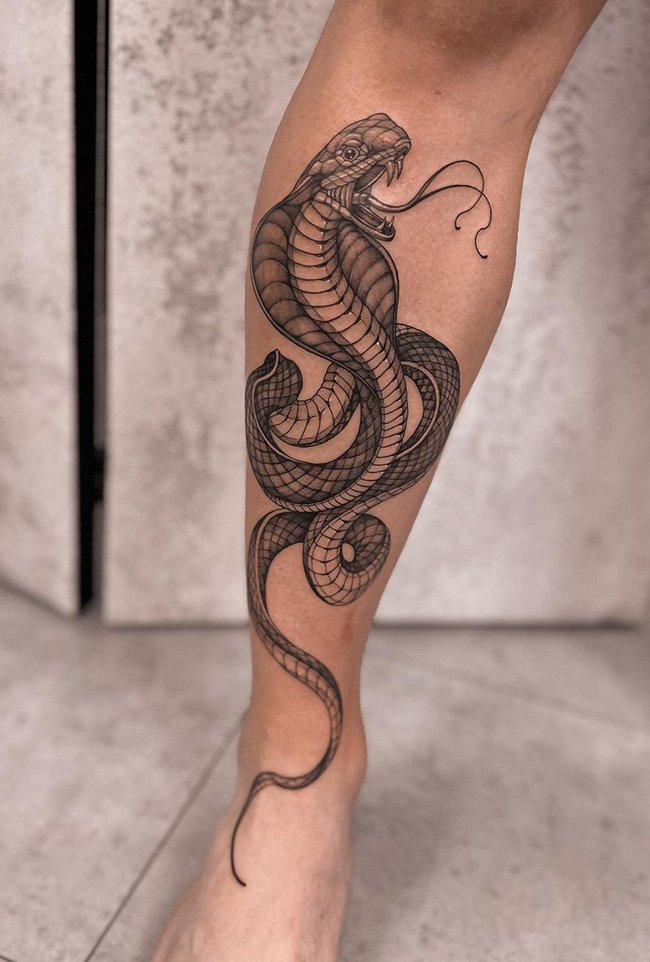
Furthermore, the cobra possesses several qualities that make it a suitable representation for individuals seeking a tattoo design that conveys strength and power. Cobras are known for their venomous bite, which makes them formidable predators in the animal kingdom. This attribute can be interpreted metaphorically in the context of a tattoo, representing the ability to protect oneself from negativity or harmful influences. The cobra tattoo becomes a symbol of personal empowerment and self-defense, reminding the wearer of their inner strength and ability to navigate through life’s challenges.
In addition to transformation and strength, the cobra tattoo also holds cultural and religious significance in various parts of the world. For instance, in ancient Egyptian mythology, the cobra was associated with royalty and protection. The image of a cobra on the pharaoh’s headdress symbolized their divine authority and guardianship. In Hinduism, the cobra is linked to Lord Shiva, one of the most powerful deities, and represents both destruction and rebirth. These cultural and religious connotations add depth and richness to the tattoo’s meaning, allowing individuals to connect with their heritage or spiritual beliefs through this symbolic representation.
The placement of the cobra tattoo can further enhance its meaning. Some may choose to have it inked prominently on their forearm, making it visible to others and serving as a reminder of their transformative journey. Others might opt for a more private placement, such as the back or chest, allowing the tattoo to be a personal symbol that only they know about. Whatever the placement, the cobra tattoo becomes an intimate expression of one’s experiences and personal growth.
In conclusion, the cobra tattoo carries multiple layers of meaning. It represents transformation, strength, and personal growth, reminding the wearer of their journey towards becoming something new and better. Whether inspired by the snake’s ability to shed its skin or influenced by its cultural and religious symbolism, the cobra tattoo serves as a powerful reminder of one’s resilience, courage, and ability to navigate life’s challenges.
Cobra Tattoo Designs: Aesthetic Variations
Now that we’ve covered the meaning behind cobra tattoos, let’s look at some popular designs.
Traditional Cobra Tattoo
The traditional cobra tattoo is typically done in black ink and features a coiled cobra with its hood raised. This design is often paired with other traditional tattoo elements, such as roses or daggers.
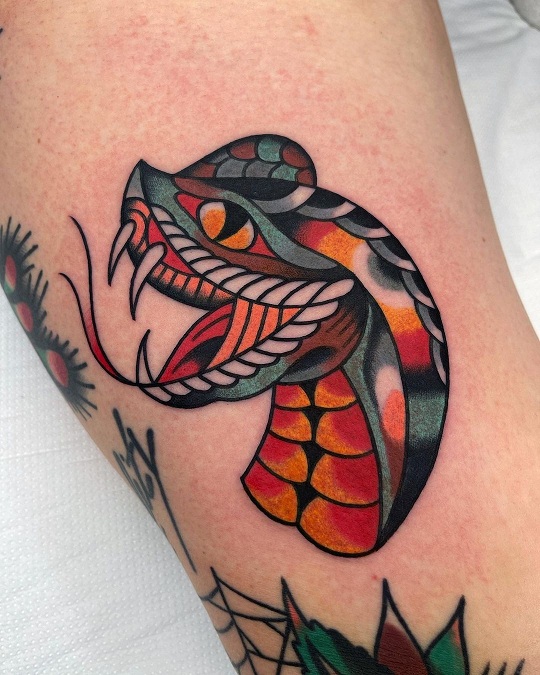
Realistic Cobra Tattoo
For those looking for a more detailed and realistic design, a realistic cobra tattoo might be the way to go. These tattoos often feature intricate shading and detail to create a lifelike image of a cobra.
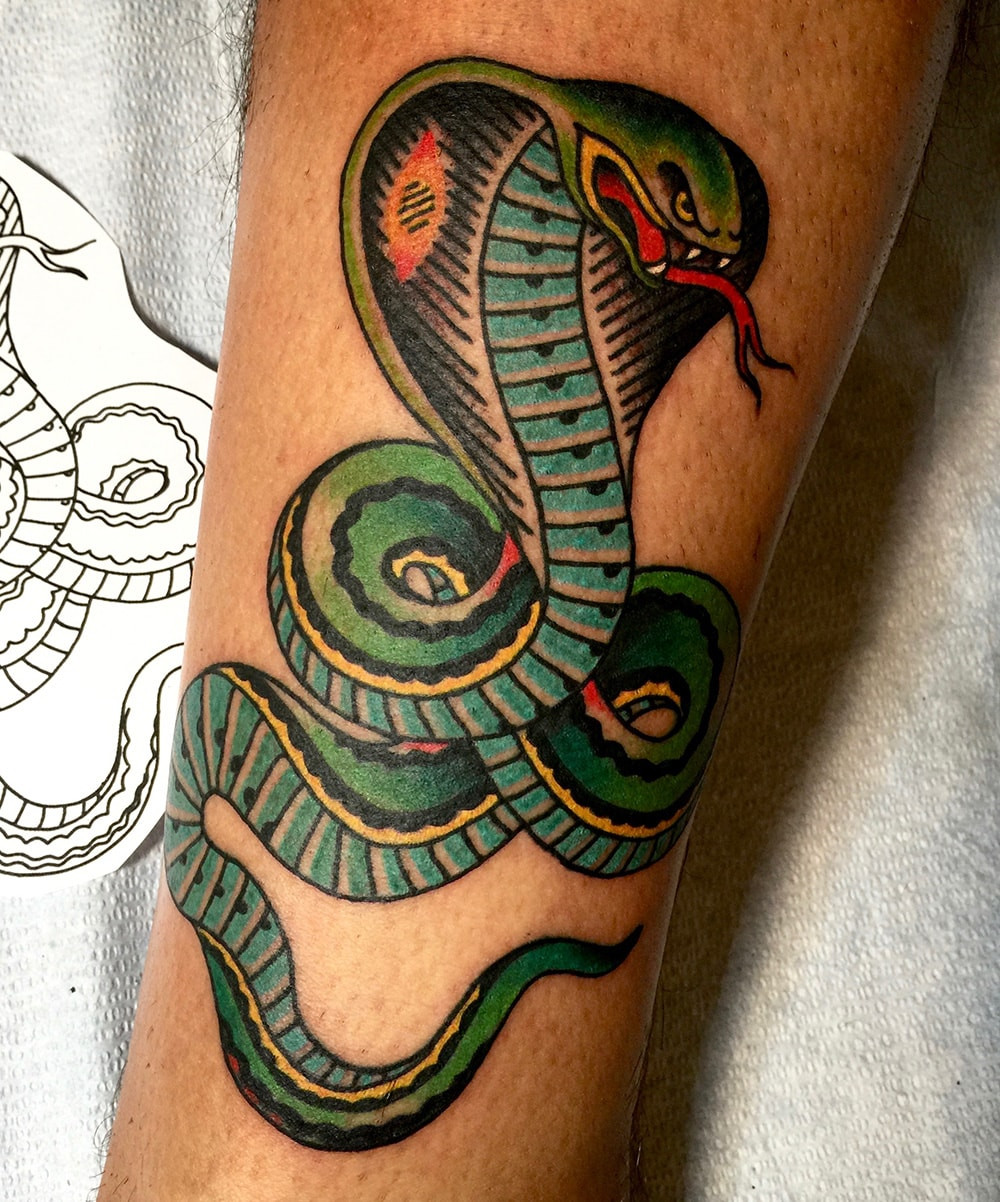
Geometric Cobra Tattoo
Geometric tattoos have become increasingly popular in recent years, and the cobra is no exception. A geometric cobra tattoo might feature the snake’s head and body made up of various shapes and lines to create a unique and visually striking design.
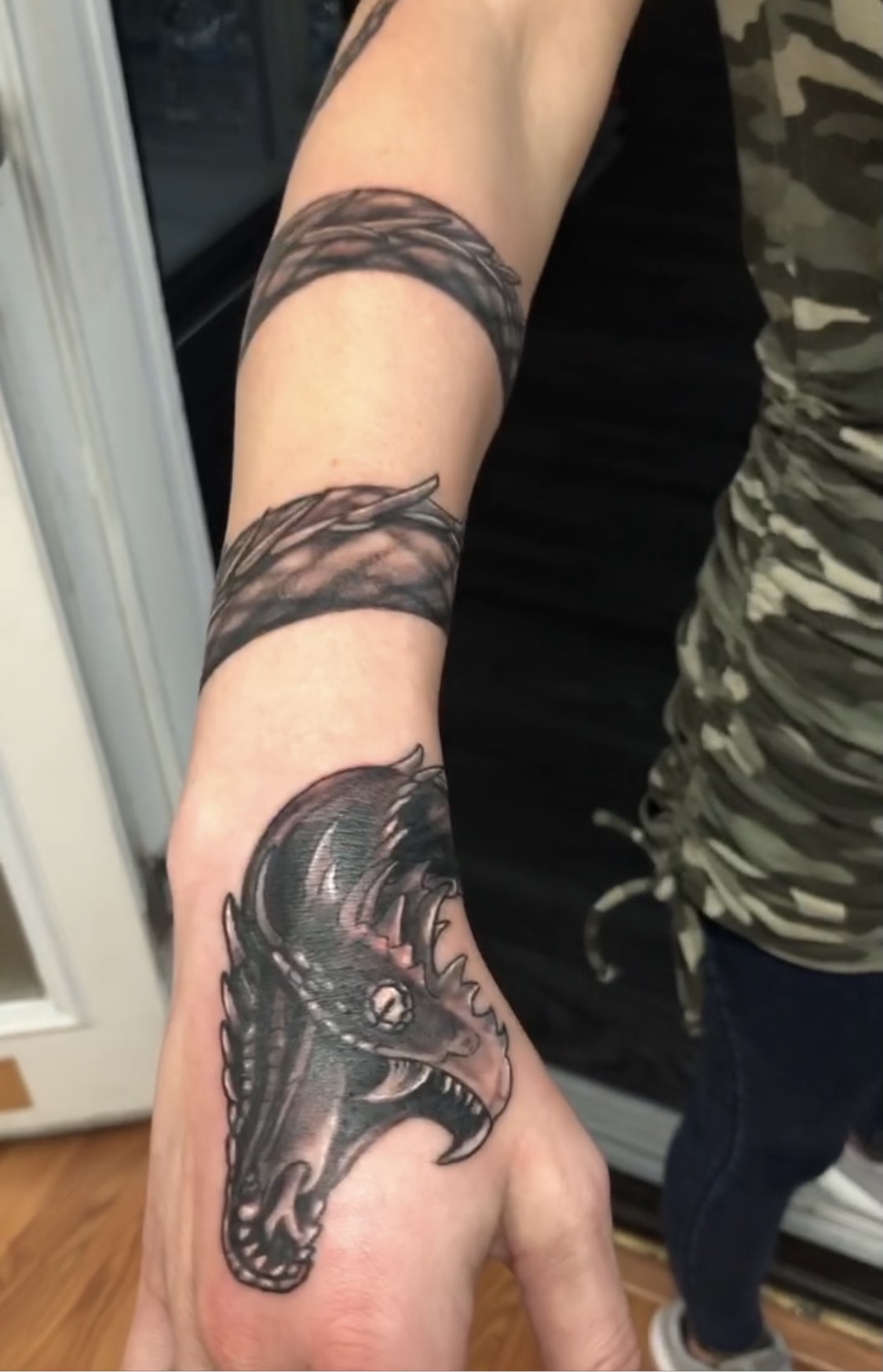
Tribal Cobra Tattoo
Tribal tattoos have been around for centuries and can still be seen today. A tribal cobra tattoo typically features bold black lines and geometric shapes to create a powerful and symbolic design.
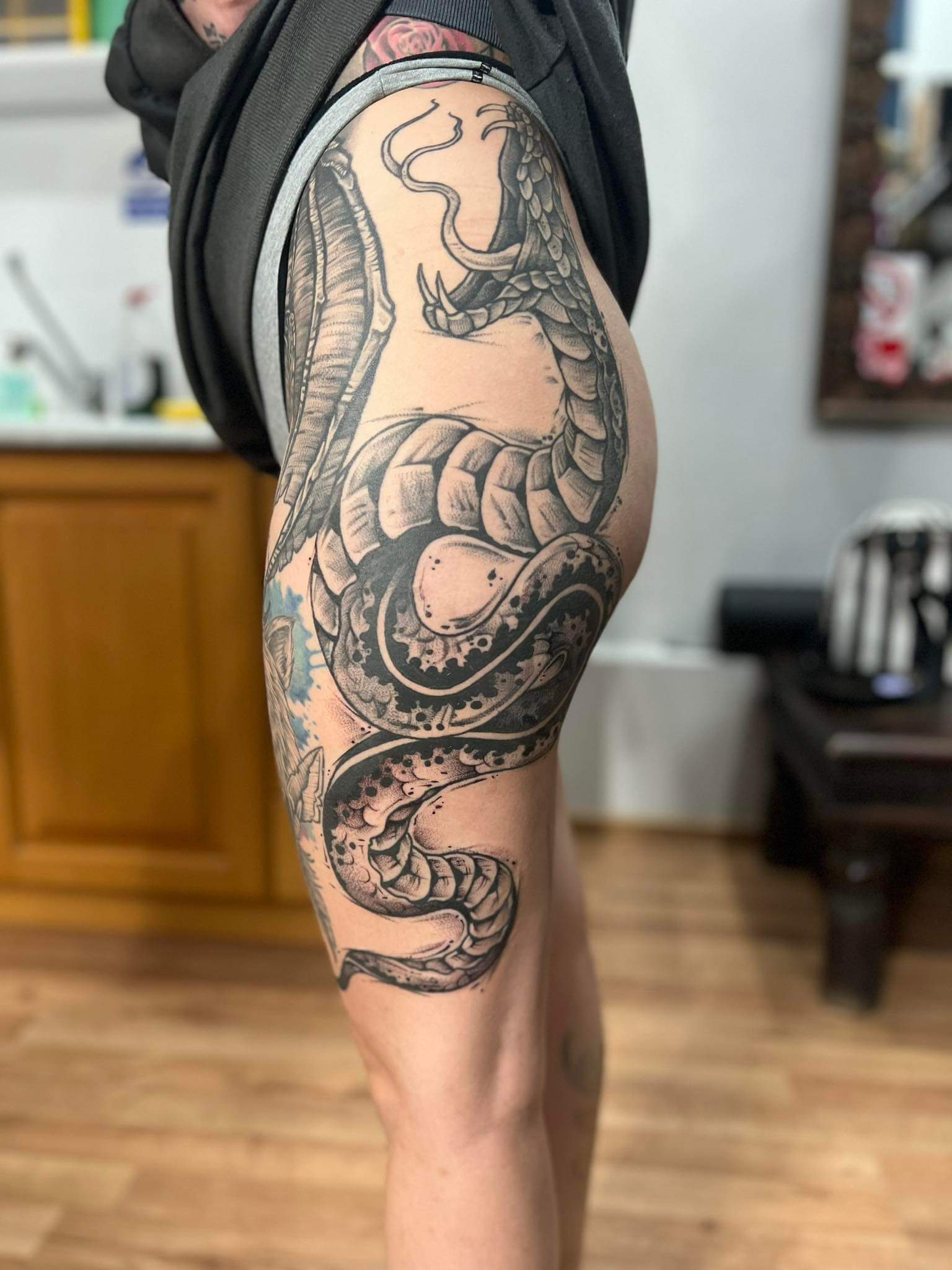
Japanese Cobra Tattoo
The Japanese culture has a long history of tattooing, and the cobra is a popular subject. Japanese cobra tattoos often feature bright colors and intricate designs that depict the snake coiled around a branch or other object.
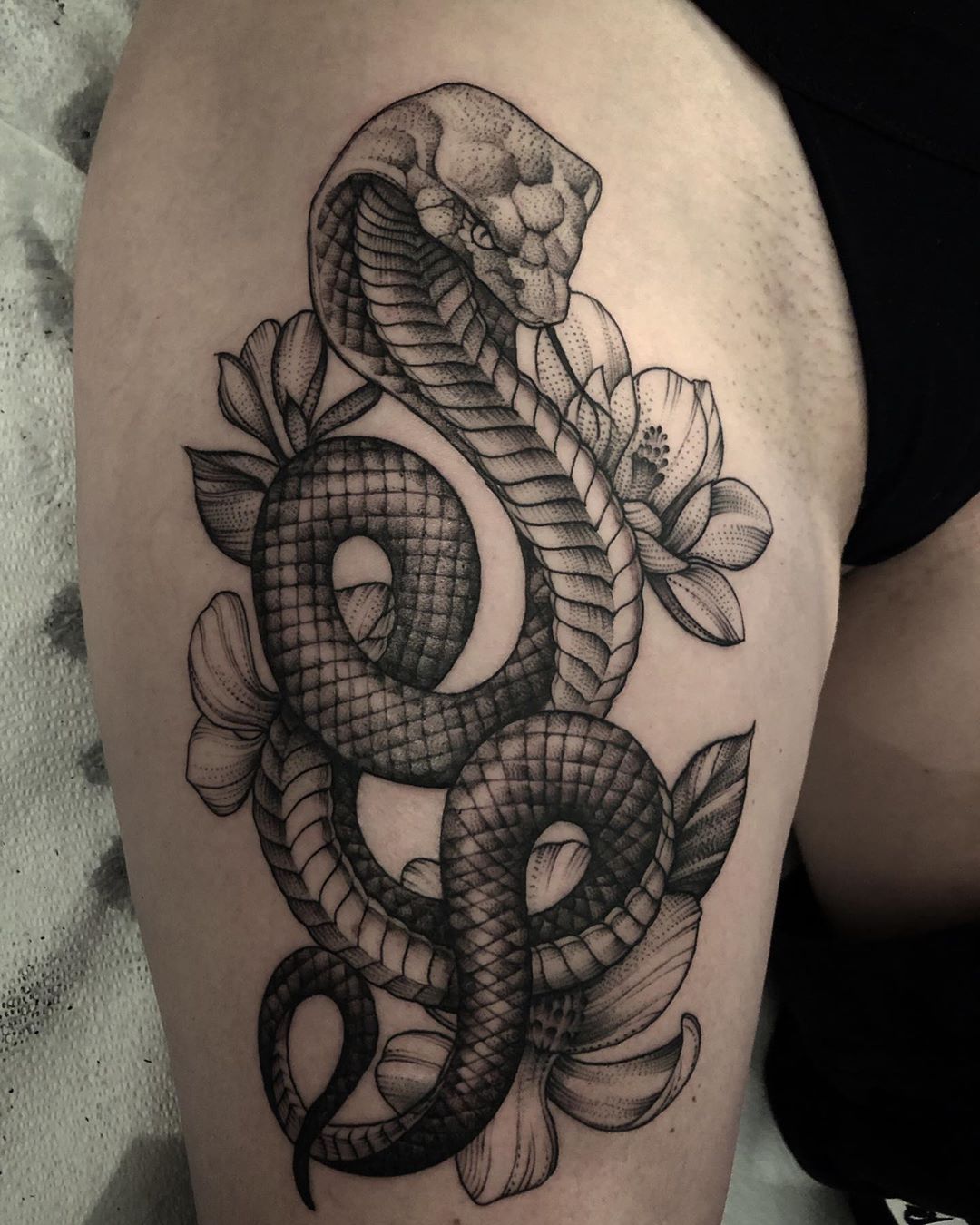
Conclusion: Embracing the Power and Beauty of Cobra Tattoos
Cobra tattoos are more than just stunning designs on the skin – they’re symbols of power, protection, transformation, and wisdom. Whether you choose a realistic, traditional, tribal, or small design, a cobra tattoo can help you connect with these powerful qualities and express them in your own unique way.
If you’re considering a cobra tattoo, take some time to explore different designs, placements, and styles, and find one that truly speaks to you. And don’t forget to choose a reputable tattoo artist who has experience with cobra tattoos and can bring your vision to life with skill and precision.
With a little patience, care, and attention, you can enjoy a beautiful and meaningful cobra tattoo that will stay with you for a lifetime.

I am Harvey Berry, a tattoo enthusiast who has immersed himself in the diverse world of ink, passionately exploring the beauty and artistry within each tattoo. My mission extends beyond uncovering the aesthetics of tattooing; it involves sharing in-depth knowledge across all aspects of this art form.
Fueled by genuine curiosity and love for every facet of tattooing, I have diligently crafted well-researched articles, with a special focus on the Tattoo Meaning of Impeccable Nest section. Here, my aim is to help the tattoo community gain a deeper understanding of the meanings and values embedded in each tattoo.
One of my primary goals is to encourage responsible decision-making when it comes to getting inked. I recognize that choosing to get a tattoo is a significant personal decision that requires careful consideration. Hence, I provide diverse resources covering the meaning of tattoos, the tattooing process, aftercare tips, and other valuable information.
Whether you are a seasoned tattoo enthusiast or embarking on your first exploration of the world of body art, I aspire to be a reliable resource for you at every step of your journey. I hope that my extensive knowledge of tattoos, especially in the Tattoo Meaning section, will assist you in finding inspiration to express yourself through the art of tattoos.
